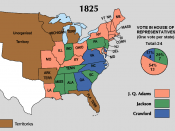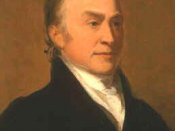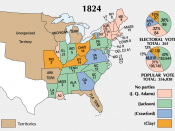The Corrupt Bargain- Elections of 1824 & 1876
The major participants in the elections of 1824 and 1876 were Henry Clay, John Quincy Adams, and Andrew Jackson were the major participants in the election of 1826. Each candidate in this election was of the Republican Party originally founded by Jefferson. In the election of 1826 the major participants were Rutherford B. Hayes and Samuel J. Tilden. Hayes was of the Republican Party and Tilden of the Democratic Party. In both these elections the central issues involved the election itself. During the elections the popular vote showed the voice of the people to be in favor of the President while the electoral vote was not in favor of that president. As a result the presidents who won the popular vote lost the presidency due to the electoral votes. The popular vote in the election of 1824 was in favor of Jackson but he lost the majority of the electoral vote thus giving the power of choosing president to the House of Representatives.
The house then took the top three candidates and voted on who should be President. The house voted in favor of Adams and although Jackson won the popular vote Adams won the presidency. In the election of 1826 Tilden won the popular vote but he was one vote shy of winning the electoral vote. This gave the presidency to Hayes. The corrupt bargain in the election of 1824 was between Clay and Adams. Clay who was not in the top three candidates for presidency decided to direct his attention on supporting another candidate. He chose Adams because he had no past grievances with him and Clay's position in the House helped him influence the representatives to vote for Adams. In return Adams granted the position of Secretary...


